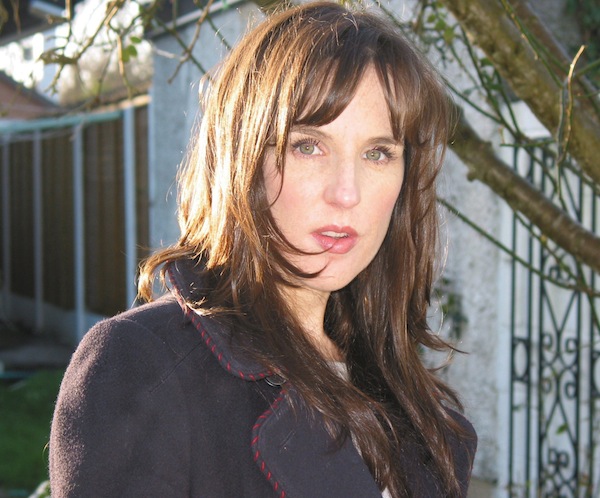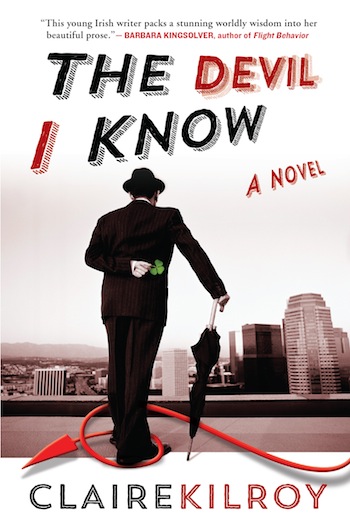Book Review: “The Devil I Know” — A Brilliant Satire of Ireland’s Boom and Bust
Claire Kilroy’s dark and fantastical comedy “The Devil I Know” nails the greed and rampaging ambition of the corrupt avatars of “the new Ireland” — developers, bankers, and government pooh-bahs.
The Devil I Know by Claire Kilroy. Black Cat Press (Grove), 361 pages, pb, $16.00.
By Katherine A. Powers
“In the kingdom of the blind the one-eyed man is banker,” wrote Myles na Gopaleen in his famous Irish Times column, Cruiskeen Lawn, some seventy years ago. What a great pity it is that the self-proclaimed Sage of Santry, Ireland’s Own Hatchetman, the Baron, His Grace, and simply My Excellency has taken himselves off to the next world and isn’t here to pronounce upon the Celtic Tiger and its ignominious collapse. Myles’s satiric surrealism, his inimitable brand of mock entrepreneurialism and indignation bouffe, strike me as the best possible way to approach the twenty-first-century Hibernian delirium. But if the man and his many voices are gone, the echo of their mad genius is still recognizable in Claire Kilroy’s dark and fantastical comedy, The Devil I Know.
The novel proceeds as a legal interrogation (a favored Mylsian device) of a man called Tristram St Lawrence, the thirteenth Earl of Howth. The year is 2016, but the questions concern activities entered upon from 2005 to 2007. This is the period during which the Irish property boom reached its catastrophic peak and began the plunge which left the country a ruinscape of unfinished buildings, moldering construction material, and abandoned cranes rusting against the sky.
Tristram is a reformed alcoholic, reformed at least in that he avoids drink, having drunk himself into a species of death. It is increasingly clear that he, a sad-sack of capacious dimensions, sees himself living — or enduring — a postmortem life. Drink is, in his words, “my soul, distilled into liquid and aching to be reunited with my body, howling to be poured back in.” He has held firm against it with the help of the stern counsel of an AA sponsor whom he’s never met called simply M. Deauville, a man, or at least voice, who phones him in his many hours of need, seeming to know just when they are.
M. Deauville is also a businessman and he begins to offer financial advice, and soon Tristram is running a holding company (“Who better to direct a shell company than a shell of a human being?”) and securing loans for some heady property developments. These, in turn, are the foul brain spawn of a great comic horror, Desmond Hickey, a brutish builder with a “balaclava of facial hair.” Thoroughly in harmony with the spirit of this age of easy plunder, Hickey has big plans for an apartment complex anchored by a fancy hotel overlooking the sea in Howth. He “looked about himself, filled his lungs with sea air. ‘I’m building me hotel right here,’ he proclaimed, throwing his arms wide, a man unlocking the energies of the earth’s molten core and chanelling them into the universe. Pandora’s Box was open for business. ‘An it’s going to be eleven storeys high!”
Competition exists in the shape of another developer, a bistro owner referred to as “the Viking” (“collar-length hair tossed back in a salty tangle, as if he had just come ashore after scudding the waves”). Other rum characters abound, among them a government minister, Ray Lawless, for whom a package of cash has, of necessity, been assembled: “Ray’s two shovel paws clamped the pack. He opened it up and stuck his nose inside, jigging the wads up and down to give them a good toss, a man distributing salt and vinegar through his bag of chips,…” Satisfied, this obliging public servant leaves abruptly, “no goodbyes, the Jiffy pack wedged under his arm like a hog.”
Actual construction is almost a formality, the least important detail to a man of vision like Hickey. He is disgusted with the make-work fastidiousness of his project’s supervising engineer, a whiner “moaning again about pipes getting broken an misaligned,” and regales Tristram with a rhapsody on shoddy construction: “‘Nobody gives a flying fuck about pipes an tanking an pressure tests an what have you since the Building Control Act of 1990. The Building No Control Act, more like it…. I’m not asking him to put his head on the block. He only has to state that the work complies with the building regulations to ‘a substantial extent,…. That’s the law in this country. That, an wearing a safety helmet.'”

Author Claire Kilroy. Her novel captures a Dublin manner of speech, the syntax and bullshittery. Photo: Helen Kilroy
The greed and rampaging ambition of such avatars of “the new Ireland” as Hickey are boundless and grotesquely funny. Hickey, with a circle of developers and government pooh-bahs, move from mere construction to plans to annex London, to buy Shanghai, all with chimerical finance. The novel’s plot has the feeling of a nightmare and the characters seem to be manifestations of a bad conscience.
Beyond the brilliantly phantasmagorical aspects of the novel, the dialog perfectly captures a Dublin manner of speech, the syntax and bullshittery, against which the catechizing legal interrogation plays an austerely comic counterpoint. The physical descriptions and their conceits are ingenious and of a distinctly Irish strain, not least in giving a near-theological dimension to matters of drink. Here is poor Tristram’s meditation on a pint of Guinness as it sorts itself out: “We waited for the tumult within the glasses to settle, the chaos that miraculously resolves itself into a well of black topped by a head of cream — a trick, a cruel trick — it never resolves, but lapses back into chaos the second you swallow it. A chaos so calamitous that you don’t know where to turn to escape it, but by then it is too late. The chaos is inside you. That is the nature of a pint.”
The Devil I Know is the fifth Irish novel I’ve read in the last few months that revolves around Ireland’s boom and bust. If such works don’t quite make up a genre, the country’s economic fiasco does seem to have replaced poverty and sin as the subjects of its greatest fascination. The despoiling boom and its humiliating collapse have altered the island quite as much as St Patrick and the advent of Christianity ever did, here wonderfully summed up in Hickey’s apartment complex and hotel after the money has dried up: “Only one of the apartment blocks was complete. The other seven stood shelled with gaping window openings. … Building to bomb site overnight. We were witnessing the remnants of a dead civilization, one that had left nothing but wreckage in its wake, the Vandals or the Goths. Except that it had not been civilised at all. Civilization was the wrong word.”
KAP, who reviews books widely, received the 2013 Nona Balakian Citation for Excellence in Reviewing from the National Book Critics Circle. She is a literary columnist for the Barnes & Noble Review, and is the editor of Suitable Accommodations: An Autobiographical Story of Family Life: The Letters of J. F. Powers, 1942 – 1963 (Farrar, Straus & Giroux).

